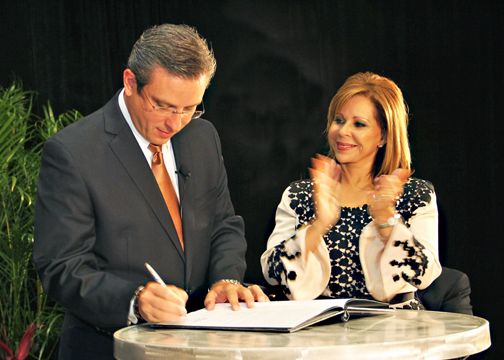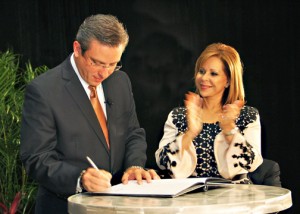Announced manufacturing advisory council already existed


Gov. García-Padilla signs the executive order creating the council, as PRMA President Waleska Rivera looks on.
New governor, same announcement.
During the Puerto Rico Manufacturers Association’s annual convention this weekend, Gov. Alejandro García-Padilla signed an executive creating a manufacturing advisory council that resembles one endorsed in 2011 by his predecessor, former Gov. Luis Fortuño.
The committee constituted Saturday has been given the task of “promoting the creation of manufacturing jobs in the short term, proposing strategies to expand the island’s industrial base, and recommending proposals for legislation and regulations needed to improve and encourage manufacturing to increase the island’s competitiveness.”
The body will be composed by public and private sector representatives, namely: the Economic Development and Commerce Secretary, who will chair it; the Puerto Rico Industrial Development Company’s executive director; the head of Puerto Rico Trade; the president of the PRMA; and three additional members representing the sector, to be appointed by the governor.
The entity will serve as a participatory body to promote continuous interaction between government and industry. This initiative responds to a claim from the Puerto Rican manufacturing industry and will facilitate collaboration in this sector on issues related to manufacturing.
“With this executive order we expand the channels of communication between the manufacturing industry and the government to ensure greater understanding, effectiveness, transparency and trust in the efforts being made by this administration,” García-Padilla said during a conversation with industry members.
While the current executive order makes no mention of it, a source close to the PRMA told this media outlet that the directive creating the advisory council meant “to make sure the that the group wasn’t eliminated with the change in government.”
A checklist of accomplishments
When the group was first constituted in the summer of 2011, with a different set of people, it was responsible for bringing ideas to the table to: improve Puerto Rico’s competitiveness in the manufacturing sector; reduce or eliminate obstacles that prevent the entry of new types of manufacturing industries; promote the transition into a knowledge-based economy; attract companies engaged in manufacturing high-value products and those based on research and development and high technology; reduce operational costs in this sector; and promote the manufacturing sector’s expansion and development.”
In October — just ahead of last year’s elections — the seven-member group presented some of the results of the work it did in about 18 months in different areas.
For example, it helped to shape the Puerto Rican Industry Investment Board and get an executive director named; it helped implement a new Single Registry for Bidders and expressed its support of the Puerto Rico Supply Chain Online program.
In the area of energy, it worked with government to procure $10 million to create an incentive program for solar energy projects to reduce costs for manufacturing companies who lease Pridco buildings, while it participated in establishing an alliance between the Puerto Rico Science and Technology Trust, the UPR and Georgia Institute of Technology to implement a technology transfer and professional education program.
The report also shows that the group collaborated with the Center for Pharmaceutical Development to increase commercial research conducted at the University of Puerto Rico and in Puerto Rico, while fostering entrepreneurship based on innovation and facilitating the commercialization of patents.
Championing local consumption
During the two-hour conversation with PRMA members, García-Padilla also reaffirmed his commitment with local companies by discussing the terms of a recently signed circular letter requiring all agency heads to assign at least 15 percent of its purchasing and contracting services to Puerto Rico suppliers or local manufacturers.
“This is meant to encourage entrepreneurship and local consumption through investment and government purchase of products and services made or generated on the island,” the governor said.
The letter falls in line with Law 14 of 2004, known as the “Puerto Rican Industry Law” that establishes the Commonwealth’s public policy to give preference to products and services made in the island.
Agency heads found in non-compliance of the letter risk losing their jobs, García-Padilla warned.




